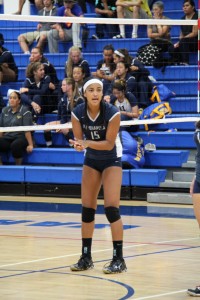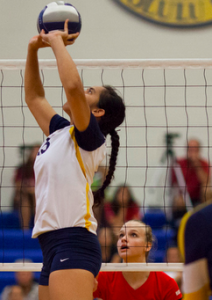They used to play against each other from different sides of the court, wear two different colored jerseys, strategically plan their next play in order to steal the point, get ahead and win the game.
Now they play on the same team, wear the same team’s jersey and work together every practice and game toward the same goal: to win together.

Sophomore Alohi Robins-Hardy and freshman Kiani Tuileta are both from Honolulu, Hawaii, and are athletes on the BYU women’s volleyball team. Robins-Hardy attended Kamehameha High School and Tuileta went to Punahou High School prior to BYU. The two high schools are notoriously known for their athletics and intense rivalry.
“I think our schools are just big power houses in Hawaii in our league,” Robins-Hardy said. “We’re huge rivals.”
Power house high schools produce power house athletes. Robins-Hardy and Tuileta are no exception.
Both girls grew up playing sports with their families and played in recreational leagues and clubs in addition to high school. Robins-Hardy was named Hawaii volleyball Gatorade Player of the Year during her senior year of high school. Tuileta was the No. 2 recruit in Hawaii by Max Preps.
The rivalry was placed more between the high schools and not between the players, although both athletes were vital members on their teams. Robins-Hardy and Tuileta both knew of each other, but no more than that.

“The volleyball community is small, so you kind of know everyone that plays volleyball,” Tuileta said. “You know of them, but you don’t know them very well. I actually had a lot of mutual friends with (Alohi), like my really good friend is her really good friend, but we never had the chance to hang out together.”
But now the girls are wearing the same jersey with the same goal to win and have to support one another. Robins-Hardy and Tuileta also happen to play in the same position: setter.
“Setters are critical in their role,” head coach Heather Olmstead said. “They’re directing the offense of our team. They’re playing defense. They’re really touching the ball a lot and they’re communicating to our team about each touch and pass. They both do that well.”
Because Robins-Hardy has been around longer and is more experienced at the collegiate level, more playing time has been given to her and fellow setter Camry Willardson. But neither Robins-Hardy or Tuileta feel a sense of rivalry on the court. Instead, they feel a need to improve as individuals so they can be ready to improve as a whole with the team. There is a slight element of competition though, which they feel is a good thing.

“I think there’s a lot of advantages where we can learn from each other, especially with her coming in and me being a year ahead,” Robins-Hardy said. “I can help her and she can help me seeing things that I need to work on and vice versa. It’s all good stuff. Just good competition every day.”
Tuileta has not played this season but sees observing from the bench as a chance to learn. Robins-Hardy has played in 25 sets against 11 teams, with the latest opponents being Portland. During this time, Robins-Hardy has made 10 kills, 206 assists, 60 digs, one block solo and 11 block assists.
Both girls are competing for spots on the court and are improving and ready to help the team for games according to Olmstead.
“Both of them have really good skills just growing up and playing volleyball so much that it’s really served them well here,” Olmstead said. “They’re so positive. I think they’re just competitors and really bring a joyful spirit to our team and a little different style of play.”
This different style of play comes from years of playing with friends and family on the beach and in gyms. The easy access to volleyball may seem as an advantage, but the athletes don’t see it that way. Robins-Hardy feels that there’s a great amount of talent in Hawaii. Tuileta noticed the main difference was height amongst the players, something she’s had to learn how to adjust to.
“In a way, every position is just trying to fight for a position on the court,” Tuileta said. “The setter unit in general has a really good relationship with competing with each other but also learning from each other. Just gotta put in the work.”
From rivals to teammates, Robins-Hardy and Tuileta look forward to working together and playing side by side as the best of friends in the many years to come.




